 |
|
|
 |
 |
 |
Breed Profile
--Written By Tiami Coleburg
--Co-Written By Patrick And Jennifer Hickey

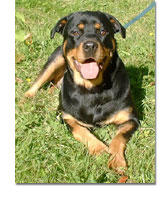 Breed: Breed:
Rottweiler
Owner Level:
For experienced involved dog owners
Average Life Span:
10-13 years
Average Weight:
Male 110 pounds, Females 90 pounds
Color And Coat:
Coarse flat coat, black in color with rust markings on cheeks, muzzle, chest, legs, above eyes and under the tail.
Typical Health Problems:
Rottweilers are generally healthy. The more frequent health problems found in the breed are: hip displaysia, rupture of cranial cruciate ligament, cancer, heart disease, enthropia eye conditions.
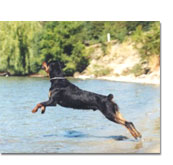 Personality: Personality:
Rottweilers are a German breed so they tend to be of a serious nature. The ideal Rottweiler is quiet, even-tempered, obedient, easy to train, faithful and brave. This breed should show a strong understanding of what is right and wrong if trained and guided by a responsible and involved owner. This is a physically strong breed that will leap to the defense of the ones they love. For this reason training and socializing is mandatory for the Rottweiler to succeed in life. These are working dogs that need a job. Boredom can lead to behavior problems. The Rottweiler personality and activity levels vary from dog to dog. Genetics, training, socializing, and the care they receive are a large part of what determines each dog's personality.
Why are these dogs typically in animal shelters?
The majority of Rottweilers in shelters arrive there as strays. Owner turn-ins of Rottweilers to shelters are due to a variety of reasons. Currently, one of the most common reasons is that the owner is moving. Rental housing is difficult to find if you live with a Rottweiler. Landlord and insurance restrictions on many breeds, including Rottweilers, are now common. Other common reasons that owners leave their Rottweilers at a shelter are:- Owner's inability to provide for this breed's intense emotional needs, socializing, and training requirements, and improper behaviors, which usually develop out of frustration, lack of proper training, and inadequate exercise.
Behavior problems can range from simple, such as house training, excessive activity level, digging, cat and dog aggression, to serious, such as human or stranger aggression. Serious human or stranger aggression can be caused by their guarding tendencies, lack of socialization, abuse, or bad breeding. Some Rottweilers arrive at shelters because of owner neglect and abuse.
How do these dogs handle rescue or shelter life?
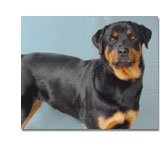 Typically, Rottweilers are not happy in a kennel setting. Rottweilers original duties were to be a herding, droving, cart and guard dog. Because of these duties, they have a natural aversion to change and unfamiliar environments. Being an extremely people-oriented breed, separation from their owners can cause severe distress. However, this breed can do very well in a home fostercare situation, in part because they tend to bond more quickly with new people in a less stressful environment. How well they tolerate a rescue or shelter depends heavily on the amount of human attention, contact, and exercise they receive, as well as on the individual dog's temperament, training levels and past life experience. An unsocialized, untrained Rottweiler will not fare well in the shelter environment. A Rottweiler with a good foundation often will succeed in adapting to the journey ahead. Even very good Rottweilers are sometimes shy or reserved in shelter facilities. However, they should not exhibit aggression. Typically, Rottweilers are not happy in a kennel setting. Rottweilers original duties were to be a herding, droving, cart and guard dog. Because of these duties, they have a natural aversion to change and unfamiliar environments. Being an extremely people-oriented breed, separation from their owners can cause severe distress. However, this breed can do very well in a home fostercare situation, in part because they tend to bond more quickly with new people in a less stressful environment. How well they tolerate a rescue or shelter depends heavily on the amount of human attention, contact, and exercise they receive, as well as on the individual dog's temperament, training levels and past life experience. An unsocialized, untrained Rottweiler will not fare well in the shelter environment. A Rottweiler with a good foundation often will succeed in adapting to the journey ahead. Even very good Rottweilers are sometimes shy or reserved in shelter facilities. However, they should not exhibit aggression.
Who should own this breed?
A Rottweiler owner should be an extremely responsible person committed to the care, training and exercise of their dog. Such an owner should be knowledgeable about this breed type and the needs of the breed they are taking on. This breed's future lies in the hands of current and future Rottweiler owners. If the current trends of over breeding and poor ownership practices continue the future of this wonderful breed could be dim. A Rottweiler should never be allowed to roam loose in any public areas, or around strange dogs. Rottweilers should be securely contained when not supervised by an adult. The Rottweiler generally does best with a good fenced yard for their safety and should be included in the every day activities of the household. This breed should be spayed/neutered. Unneutered males can become male dog aggressive and hard to manage and are predisposed to some cancers. Unspayed females can become moody/difficult and predisposed to uterine problems and cancers. Because of the lack of available rentals to high risk breeds, Rottweiler owners need to consider the possibility of any future moves that might put their dog's life at risk. One of the main keys to successful Rottweiler ownership is ongoing positive obedience training and socialization. For the right dedicated owner a Rottweiler can be the best of dog companions.
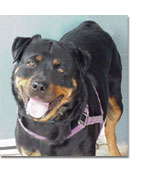 Is this breed good with children? Is this breed good with children?
Children and dogs should never be left alone and unattended, even for a moment. Young children do not have proper dog etiquette, and dogs do not understand a child's behavior. This can result in tragedy with any breed of dog. Rottweilers tend to love and be dedicated to their human family and can be especially fond of children. Many Rottweilers are naturally drawn to children and can be very patient and loving companions. Like children, each dog is different in personality, energy and patience levels. So, each dog and child relationship should be considered individually.
Is this breed good with other dogs in general?
Rottweilers generally do well with other dogs if they have been socialized and trained properly. For Rottweilers, especially males, spaying/neutering is one of the most important keys to having a dog-friendly animal. Pack position is important and will affect and vary each dog's acceptance of other dogs.
How easy is training and house training with this breed?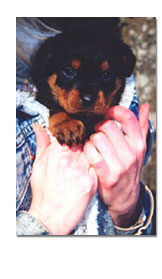
Rottweilers are very intelligent and generally if in tune with their trainer can learn some tasks in 2 to 10 repetitions. Like humans each dogs abilities, likes and dislikes will vary. In general a learning Rottweiler is a happy Rottweiler. Good training gives Rottweilers and all dogs the ability to speak the same language with us. Give a Rottweiler good structure and rules in their life or they will structure their own life and make their own rules. They can be stubborn, strong willed and generally require ongoing training for life. The time required to house train a Rottweiler will vary depending on each dog and on the method used. Positive methods and consistency will work best for all training with this breed. Crate training seems to be of great assistance for most dogs in house breaking.
Socializing this breed?
Socialization is one of the necessary requirements to successful Rottweiler ownership. The unsocialized Rottweiler can be dangerous. This breed is reserved with change so they need to be exposed regularly to a large variety of environments and experiences. They should be given the social skills and taught manners early on. Rottweilers should exhibit a reserved to friendly personality with strangers. They should not be aggressive. A Rottweiler that shows aggression should be evaluated by a professional trainer and behaviorist immediately. |
|

